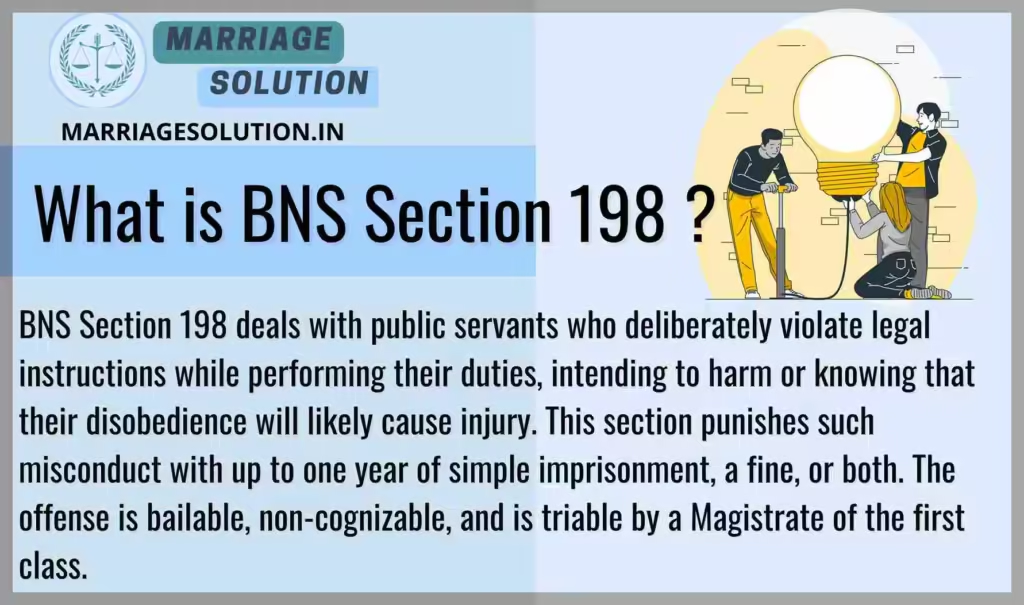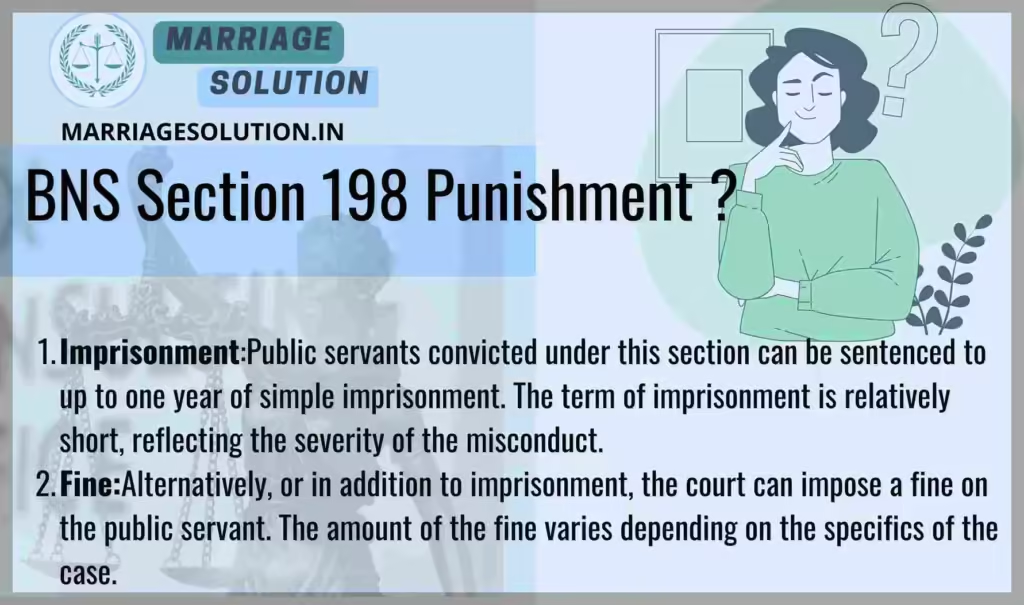Introduction of Section BNS 198
BNS 198 deals with the accountability of public servants who misuse their authority by deliberately disobeying legal directions. If such disobedience is done with the intention to cause harm, or with the knowledge that it will likely result in injury to another person, it becomes a punishable offense. This law ensures that public officials act responsibly and do not exploit their position to harm citizens. It strengthens public trust in governance and reinforces the rule of law.
The Bharatiya Nyaya Sanhita (BNS) Section 198 replaces the old Indian Penal Code (IPC) Section 166.
What is BNS Section 198 ?
BNS Section 198 deals with public servants who deliberately violate legal instructions while performing their duties, intending to harm or knowing that their disobedience will likely cause injury. This section punishes such misconduct with up to one year of simple imprisonment, a fine, or both. The offense is bailable, non-cognizable, and is triable by a Magistrate of the first class.

Under Section 198 of the bns act 2023
Whoever, being a public servant, knowingly disobeys any direction of the law as to the way in which they are to conduct themselves in their official capacity, intending to cause, or knowing it to be likely that they will, by such disobedience, cause injury to any person, shall be punished with simple imprisonment which may extend to one year, or with fine, or with both.
1. Meaning of “Disobeying Law with Intent to Cause Injury”
- Public servants are bound by law to perform their duties fairly and according to legal directions.
- If a public servant deliberately disobeys a legal order or rule in their official role, with the intention of causing harm or knowing that harm will likely result, it is an offense under BNS 198.
- Injury here can mean financial loss, physical harm, denial of rights, or mental distress caused to an individual.
2. Who is Covered?
This section applies to:
- Government officials (clerks, officers, administrators).
- Police officers on duty.
- Revenue officers or those executing court orders.
- Any public servant performing legal duties under state or central authority.
3. Nature of the Offense
- Bailable → The accused can apply for bail.
- Non-cognizable → Police cannot arrest without a warrant.
- Non-compoundable → The case cannot be privately settled; it must go through trial.
- Triable by Magistrate of First Class → Ensures judicial oversight of such misconduct.
4. Examples of BNS Section 198
- Example 1: A police officer refuses to register an FIR for theft despite being legally required to, because the accused is influential. This causes loss and injustice to the victim. The officer is guilty under Section 198.
- Example 2: A revenue officer ignores a court’s order to seize property in a debt recovery case, knowing that the creditor will suffer loss. This deliberate disobedience makes them liable under Section 198.
- Example 3 (Not Guilty): A public servant misunderstands a legal order and unintentionally fails to act correctly. Since there was no intent to cause injury, this will not fall under Section 198.
5. Punishment under BNS Section 198
- Imprisonment → Simple imprisonment up to 1 year.
- Fine → Court may impose monetary penalty.
- Both → Judge may order imprisonment and fine together.
6. Importance of BNS Section 198
- Ensures Accountability – Prevents misuse of power by public servants.
- Protects Citizens’ Rights – Shields individuals from harm caused by official negligence or malice.
- Maintains Trust in Institutions – Reinforces the duty of public servants to act within the law.
- Acts as a Deterrent – Warning to officials against deliberate violations for personal or political reasons.
Section 198 BNS Overview
BNS Section 198 addresses the misconduct of public servants who knowingly disobey legal directions in their official duties, intending to cause harm or knowing that their actions are likely to cause injury to another person. It is designed to ensure that public servants act within the bounds of the law and are held accountable if they fail to do so with malicious intent.
BNS Section 198 – 10 Key Points
- Applicability to Public Servants:
- This section specifically applies to public servants, including government officials, police officers, or any individual serving in a public capacity.
- Explanation: It holds officials accountable for violating legal obligations tied to their roles.
- Knowingly Disobeying Legal Directions:
- A public servant commits an offense if they knowingly disobey a direction from the law. The disobedience must be intentional.
- Explanation: The law doesn’t punish innocent mistakes or misunderstandings, but willful disregard of legal instructions.
- Intent to Cause Injury:
- The public servant must have acted with the intent to cause harm or, at the very least, be aware that their actions would likely result in injury to another person.
- Explanation: Intent plays a crucial role; without the intention to harm, the offense may not be applicable.
- Illustration of an Example:
- The section gives an example where an officer fails to seize property in a legal execution case, knowing that such a failure would cause financial loss to the person in whose favor the court issued the decree.
- Explanation: This shows how deliberate inaction or disobedience can hurt the rights of individuals.
- Punishment:
- A public servant found guilty under this section faces simple imprisonment for up to one year, a fine, or both.
- Explanation: The severity of the punishment depends on the seriousness of the disobedience and its consequences.
- Non-Cognizable Offense:
- Since the offense is non-cognizable, the police cannot arrest the public servant without a warrant. A formal complaint and judicial process are required.
- Explanation: This reflects the need for legal proceedings before an arrest is made.
- Bailable Offense:
- The offense is bailable, meaning the accused public servant can apply for bail and does not need to remain in custody until trial.
- Explanation: The accused has the right to be released on bail while awaiting trial, except under certain circumstances.
- Triable by a Magistrate of the First Class:
- Cases under BNS Section 198 are tried in a court led by a Magistrate of the first class.
- Explanation: The case is overseen by an experienced judicial officer who handles such legal matters.
- Non-Compoundable Offense:
- The offense is non-compoundable, meaning it cannot be settled out of court or withdrawn after the case has started.
- Explanation: The case must go through a formal legal process, and a compromise between the accused and victim cannot end it.
- Ensuring Accountability in Public Service:
- The primary purpose of this section is to ensure that public servants follow the law and do not misuse their positions to harm others.
- Explanation: This helps maintain trust in public institutions and protects citizens from abuse of power by officials.
BNS Section 198 – 2 Examples
- Example 1:
- A police officer, who is legally required to investigate a complaint of theft, intentionally delays the investigation because the accused is a friend. As a result, the victim suffers financial loss. The police officer knowingly disobeyed legal duties, causing injury to the victim. Under BNS Section 198, the officer can be charged for dereliction of duty with intent to harm.
- Example 2:
- A revenue officer refuses to seize property ordered by the court to settle a debt, even though they are aware that this refusal will cause financial injury to the creditor. The officer acted with the knowledge that the creditor would suffer harm, thus falling under the scope of BNS Section 198.
BNS 198 Punishment
- Imprisonment:
- Public servants convicted under this section can be sentenced to up to one year of simple imprisonment. The term of imprisonment is relatively short, reflecting the severity of the misconduct.
- Fine:
- Alternatively, or in addition to imprisonment, the court can impose a fine on the public servant. The amount of the fine varies depending on the specifics of the case.

BNS 198 bailable or not ?
Yes, BNS Section 198 is a bailable offense. This means that a public servant accused under this section can apply for bail. The court will decide whether or not to grant bail, but it is generally easier to obtain bail for bailable offenses.
Comparison – BNS Section 198 vs IPC Section 166
| Section | What it Means | Punishment | Bail | Cognizable? | Trial By |
|---|---|---|---|---|---|
| BNS Section 198 | Applies to any public servant who knowingly disobeys a direction of law in their official duty, intending to cause injury or knowing that it is likely to cause harm to another person. Ensures accountability and prevents misuse of authority. | Simple imprisonment up to 1 year, or fine, or both. | Bailable | Non-cognizable | Magistrate of the First Class |
| IPC Section 166 (Old) | Covered public servants who disobeyed legal directions in their official capacity, causing or likely to cause injury to any person. Focused on the misuse of authority in administrative actions. | Imprisonment up to 1 year, or fine, or both. | Bailable | Non-cognizable | Magistrate of the First Class |
| Key Difference: BNS 198 retains the essence of IPC 166 but modernizes the language for clarity, explicitly linking intent and awareness of injury. It strengthens accountability by clearly defining “disobedience with intent to cause harm” and ensuring better enforcement against abuse of power. | |||||
BNS Section 198 FAQs
What is BNS Section 198?
BNS Section 198 deals with public servants who deliberately disobey legal instructions in their official duties, intending to cause harm to others.
What is the punishment under BNS Section 198?
A public servant found guilty under this section can be sentenced to simple imprisonment for up to one year, fined, or both.
Is BNS Section 198 a bailable offense?
Yes, BNS Section 198 is a bailable offense. The accused can apply for bail, and it is up to the court to grant it.
Can a public servant be arrested without a warrant under BNS Section 198?
No, as it is a non-cognizable offense, the police cannot arrest the public servant without a warrant.
Who tries cases under BNS Section 198?
Cases under this section are tried by a Magistrate of the first class.
What is an example of a violation under BNS Section 198?
An example would be a government official intentionally refusing to carry out a court order, knowing that it would cause financial harm to a person involved in a legal case.
Conclusion
BNS Section 198 plays a vital role in ensuring that public servants cannot misuse their official powers to harm individuals. By holding them accountable for intentional disobedience of legal directions, this section reinforces discipline in governance and safeguards the rights of citizens. Its similarity with IPC Section 166 highlights continuity, but under the new framework, it further emphasizes transparency and accountability in public service.
Need Legal Support?
If you are dealing with court cases, marriage problems, or any other legal issue, our team at Marriage Solution – Lawyer Help is here for you. Simply fill out our quick online enquiry form, and we’ll connect you with the right legal expert to support your needs.
Finished with BNS 198 ? Continue exploring the next provisions of the Bharatiya Nyaya Sanhita (BNS), 2023. Each section includes explanations, examples, and plain-language breakdowns for easy understanding.
- BNS 199 : Public servant disobeying direction under law.
- https://marriagesolution.in/bns_section/bns-199/
- BNS 200 : Punishment for non-treatment of victim.
- https://marriagesolution.in/bns_section/bns-200/
- BNS 201 : Public servant framing an incorrect document with intent to cause injury.
- https://marriagesolution.in/bns_section/bns-201/
- BNS 202 : Public servant unlawfully engaging in trade.
- https://marriagesolution.in/bns_section/bns-202/
- BNS 203 : Public servant unlawfully buying or bidding for property.
- https://marriagesolution.in/bns_section/bns-203/
Full IPC Section List: https://marriagesolution.in/ipc-section-list
All Indian Law & Blogs: https://marriagesolution.in/indian-law/
Full BNSS Section List: https://marriagesolution.in/bnss_section-list
